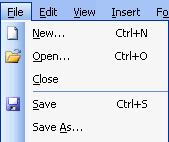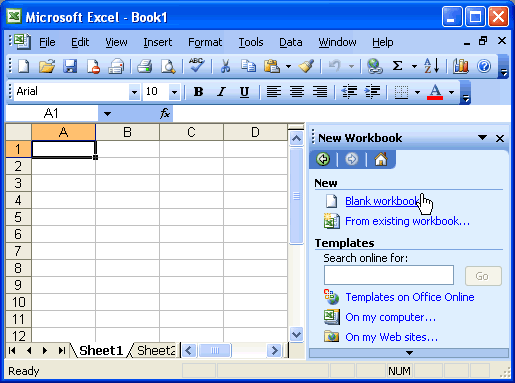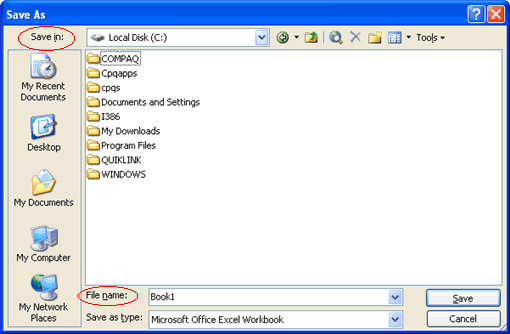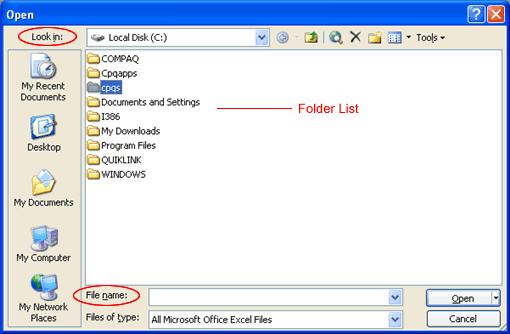Excel 2003
Create, Open, and Save Workbooks
Introduction
By the end of this lesson, you should be able to:
- State the differences between New, Open, Close, Save, and Save As
- Create a workbook
- Save a workbook
- Open a workbook
- Close a workbook
Understanding file terms
The File menu contains all of the operations that we'll discuss in this lesson: New, Open, Close, Save, and Save As.

New
This is used to create a new workbook.
Open
This is used to open an existing file from a floppy disk or hard drive of your computer.
Close
This is used to close a spreadsheet.
Save As
This is used to save a new file for the first time or to save an existing file with a different name.
Save
This is used to save a file that has had changes made to it. If you close the workbook without saving it, any changes that were made will be lost.
Creating a workbook
A blank workbook is displayed when Microsoft Excel is first opened. You can type information or design a layout directly in this blank workbook.
To create an Excel workbook:
- Choose File
 New from the menu bar.
New from the menu bar.

- The New Workbook task pane opens on the right side of the screen.

- Choose Blank Workbook under the New category heading.
- A blank workbook opens in the Excel window. The New Workbook task pane is closed.
Saving a workbook
Every workbook created in Excel must be saved and assigned a name to distinguish it from other workbooks. The first time you save a workbook, Excel will prompt you to assign a name through the Save As operation. Once assigned a name, any additional changes made to the text, numbers, or formulas must be saved using the Save operation.
To save a new workbook:
- Choose File
 Save As from the menu bar.
Save As from the menu bar.

- The Save As dialog box appears.
- Click the Save In: dropdown menu, and locate where the file will be saved. Choose 3 1/2 Floppy (A:) to save the file to a floppy disk or Local Disk (C:) to save the file to your computer.
- Type a name for your file in the File Name: box.
- Click the Save button.

To save changes made to an existing workbook:
- Choose File
 Save from the menu bar, or
Save from the menu bar, or
Click the Save button on the Standard toolbar.
Save button on the Standard toolbar.
 If you're saving the file for the first time and you do not choose a file name, Microsoft Excel will assign a file name for you.
If you're saving the file for the first time and you do not choose a file name, Microsoft Excel will assign a file name for you.
 It's a good idea to save frequently when working in a spreadsheet. Losing information is never fun! You can quickly save your spreadsheet by using the quick-key combination Ctrl + S.
It's a good idea to save frequently when working in a spreadsheet. Losing information is never fun! You can quickly save your spreadsheet by using the quick-key combination Ctrl + S.
Opening a workbook
You can open any workbook that has previously been saved and given a name.
To open an existing Excel 2003 workbook:
- Choose File
 Open from the menu bar.
Open from the menu bar.

- The Open dialog box opens.

- In the Look in list, click the drive, folder, or Internet location that contains the file you want to open.
- In the folder list, open the folder that contains the file. Once the file is displayed, click the file you want to open.
- Click the Open button.
Closing a workbook
To close an existing Excel 2003 workbook:
- Choose File
 Close from the menu bar. The workbook in the Excel window is closed.
Close from the menu bar. The workbook in the Excel window is closed.

 Excel 2003 will prompt you to save information if anything new has been typed between the last save and the time you close the file.
Excel 2003 will prompt you to save information if anything new has been typed between the last save and the time you close the file.
Challenge!
In this challenge, you will create a spreadsheet that allows you to track your monthly income and expenses. This file will be used in all of the remaining Excel 2003 challenges.
- Create a new blank file, and save it as Monthly Budget.
- Close the blank file.
 Important reminder: If you are using a public computer, such as one at a library or learning center, you may not be able to use the same computer each time. It is important to understand the policies on saving documents to public computers. Some places do not allow you to use floppy disks due to the risk of computer viruses. Ask someone in charge of the public computers where you are. If you are unsure how you will keep a recent copy of the assignment, you can always email a copy of the document to yourself when you finish working on it.
Important reminder: If you are using a public computer, such as one at a library or learning center, you may not be able to use the same computer each time. It is important to understand the policies on saving documents to public computers. Some places do not allow you to use floppy disks due to the risk of computer viruses. Ask someone in charge of the public computers where you are. If you are unsure how you will keep a recent copy of the assignment, you can always email a copy of the document to yourself when you finish working on it.


